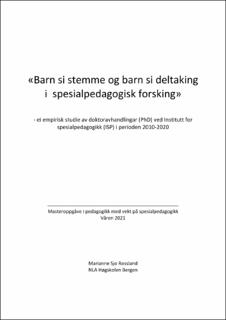"Barn si stemme og barn si deltaking i spesialpedagogisk forskning" : ei empirisk studie av doktoravhandlingar (PhD) ved Institutt for spesialpedagogikk (ISP) i perioden 2010-2020
Master thesis
Permanent lenke
https://hdl.handle.net/11250/2775182Utgivelsesdato
2021Metadata
Vis full innførselSamlinger
Sammendrag
The main theme of this thesis is research on previous research in the field of special education. It is a qualitative document analysis of doctoral dissertations published by the Department of Special Needs Education (ISP) in the period 2010-2020. The purpose of this project is to find answers to what extent and in what way children can participate in research relating to themselves and their everyday life. In addition, I have focused on looking for trends in research, so that one can compare the research Reidun Tangen (2011) did on doctoral dissertations, PhD, at ISD between 1990-2009. My main focus have been to bring forward the epistemic contributions that lie in the research where children have been active in the research process. As previous research and theory in this field states; the methodological challenges and the relational factors between children as informants and researchers is essential. The study addresses the main research question:
"What kind of epistemic contribution do doctoral dissertations submitted at ISP in the period 2010-2020 give when it comes to including children's voices in special education research?"
In order to obtain the various tendencies in the material, I have made an approximate replication of Tangen's survey from 2011. I have used a quantitative analysis of the data material in order to obtain tables as a criteria for selection. Furthermore, a simplified qualitative document analysis of the main sample is made, consisting of five doctoral dissertations where the researchers use interviews as a research method. Based on the empirical findings in my study, I refer to various areas that can contribute to research in order to involve children and to let their voices be heard. My findings show that conscious use of methods and the combination of different methods both are crucial, when facilitating and doing research in the field of special education, where the children as research objects can participate on their own terms. The researcher's relationship with the informant is also a decisive factor in creating security and a good basis for being able to bring out the children's thoughts, views and knowledge about their own everyday life. The use of different learning landscapes in research is an area that can contribute to creating new spaces and may be necessary to be able to create opportunities for good dialogues with the students in their everyday context.
